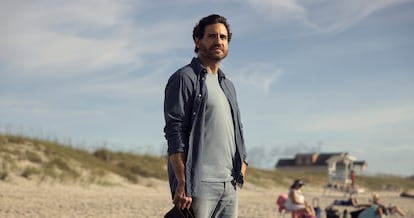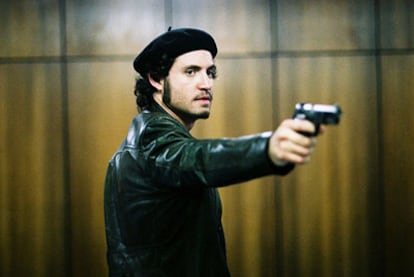Edgar Ramírez: ‘Violence in fiction is fantasy; it’s sublimation. What book is more violent than the Bible?’
The Venezuelan actor, currently one of the most popular Latin Americans in film and television, does not shy away from voicing his political opinions in a Hollywood he sees as increasingly polarized


Edgar Ramírez became a pioneer by succeeding simultaneously in auteur cinema and television with the same project. It was with his portrayal of the terrorist known as the Jackal in the miniseries Carlos (2010) by Olivier Assayas, which was also screened in its entirety, like a movie, at film festivals. Since then, the Venezuelan actor has made progress in both mediums, handling himself with ease in the American, Latin American and European industries. He is also the producer and star of his latest hit, the series Florida Man, which, according to Netflix data, has been one of the most viewed contents on that platform in recent weeks.
In it, an ex-cop has to return to his hometown to track down the girlfriend of the gangster to whom he owes money to, with whom he has a dangerous love affair. As the plot thickens, he ends up involved in the search for an outrageous, deadly treasure. The actor, who portrayed Gianni Versace for Ryan Murphy, has already shot the second season of Dr. Death, where he plays another real character, the Italian surgeon Paolo Macchiarini, who murdered several of his patients, obsessed with his medical experiments. Ramírez, who does not shy away from voicing his political opinions in an increasingly polarized Hollywood, spoke with EL PAÍS from Paris, where he is working with Selena Gomez and Zoe Saldaña on the musical Emilia Perez, the new film by Jacques Audiard (A Prophet, Rust and Bone).
Question. The Florida man is a tragicomic character; he himself unwittingly causes many of the problems he has to solve.
Answer. He is a deeply dramatic guy, he exaggerates everything. He’s like Wile E. Coyote: as he tries to reach what he thinks he needs, everything ends up blowing up in his face, he gets hit by a train... He has such self-confidence that it’s moving. He feels invincible, not out of arrogance, but out of naivety. Behind the grotesque is the absurd, behind the absurd is comedy and behind comedy is drama. It’s all connected.
Q. Don’t you feel a certain ambivalence due to the way that Cannes, the festival that elevated you and where you are a regular, confronts the stories of platforms like Netflix?
A. We are living a radical change in real time. Not only in the way in which we consume contents; it’s also an existential change that has to do with the technological explosion in general. I often find myself conflicted by this matter, too. Something that helps is trying to be a man of my time and being open to discussion. The experience of watching a movie in a movie theater, living such intimate emotions in such a public way, is irreplaceable. I felt it again last year when I was a judge at Cannes. I wouldn’t want my nephews to miss an experience like this.
Q. But when a viewer finishes watching Florida Man on Netflix, they can discover five more things where you appear without leaving the platform.
A. That’s right. In addition, the platforms have given us the opportunity to democratize content, so that a more humble production, from a country that historically has no audiovisual industry, suddenly becomes the most watched content in the world. How many beautiful films, in which we industry professionals firmly believed, ended up reaching so few people...
Q. On the other hand, the screenwriters are on strike right now in the United States, fighting, among other things, against those platforms.
A. The writers have every right to be on strike. I totally and firmly support their fight, that they get paid properly, with the right contracts. Technology is a double-edged sword. The debate we have to face is how to protect that experience of showing content and at the same time expand it, protecting its authors and also the viewers.
Q. This reminds me that you wanted to be a diplomat and that you dealt with political issues when you were a journalist.
A. All human interaction is political. Even declaring yourself apolitical is a political position. You can’t escape a human phenomenon like that. Making a movie is one of the most political acts in the world, because it is a group of people who have to organize to achieve something collectively. I have been lucky enough to work in many places in the world: Hollywood, Latin America, now in Europe... I come from a deeply polarized country, and fierce affiliations, which also arise in the industry, make me cringe. I learned from the experience of the great tragedy that took place in Venezuela that collective obsessions are to be feared. I even want to work in Bollywood!

Q. You were part of Don’t Shoot, Amnesty International’s campaign in favor of gun control in the United States, with which you maintain your political commitment.
A. What many people are proposing is not to eliminate the use of weapons, as I and others would like, but more control. How can someone be too young to drink but not to buy an automatic rifle? For those of us who were not born in the United States or in that culture, it is very difficult to understand.
Q. But a show like Florida Man is full of characters that use guns.
A. Fiction is fantasy; it’s sublimation. I don’t think there is a direct correlation. What book is more violent than the Bible? A country with greater violence in its cultural manifestations, such as Japan, with manga and anime, is also a much more peaceful society than the United States. So this theory that fictional violence carries over into real life... It’s very complicated. It is the perfect excuse for the lack of political will for gun control. In the campaign, we state that the only place a gun should be is on a screen. Millions of people play a video game that’s considered violent and not all of them are out there killing people. Let’s get serious and look for the real reasons.
Q. Guillermo Arriaga, a mentor and friend of yours, once said to EL PAÍS that when you write, you look into yourself, into your own life. Does the same thing happen to an actor?
A. It exists as a secret dance between actors and characters. I used to talk about it a lot with Juliette Binoche when we made a movie together. She said that in the process of understanding a character you had to find something inside you that made you understand it. In my case, curiosity comes first, the need to want to go through the character’s experience.
Q. What if they’re especially sleazy characters, like a terrorist like the Jackal or like in Dr. Death?
A. Sometimes you find impressive things in your life and you are able to use them for the character. Other times you don’t, and you are not able to understand it. I’m still processing the shooting of Dr. Death, which I finished in April. He’s a seedier character than the Jackal, because the terrorist uses ideology as justification for murdering people he often doesn’t see or know. Even if you cannot justify it, you understand that it is a somewhat more remote process. But this doctor knew the names of his patients, their hopes, their pain, their relatives... That betrayal of trust shook me too much, even if he killed thinking that he was helping a greater good. It was hard and many of the conclusions that I will draw from that character will come with time.
Sign up for our weekly newsletter to get more English-language news coverage from EL PAÍS USA Edition
Tu suscripción se está usando en otro dispositivo
¿Quieres añadir otro usuario a tu suscripción?
Si continúas leyendo en este dispositivo, no se podrá leer en el otro.
FlechaTu suscripción se está usando en otro dispositivo y solo puedes acceder a EL PAÍS desde un dispositivo a la vez.
Si quieres compartir tu cuenta, cambia tu suscripción a la modalidad Premium, así podrás añadir otro usuario. Cada uno accederá con su propia cuenta de email, lo que os permitirá personalizar vuestra experiencia en EL PAÍS.
¿Tienes una suscripción de empresa? Accede aquí para contratar más cuentas.
En el caso de no saber quién está usando tu cuenta, te recomendamos cambiar tu contraseña aquí.
Si decides continuar compartiendo tu cuenta, este mensaje se mostrará en tu dispositivo y en el de la otra persona que está usando tu cuenta de forma indefinida, afectando a tu experiencia de lectura. Puedes consultar aquí los términos y condiciones de la suscripción digital.








































